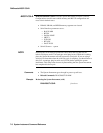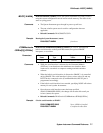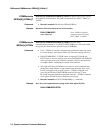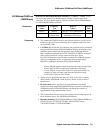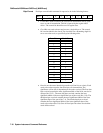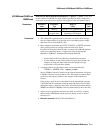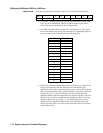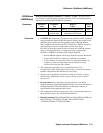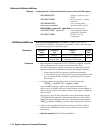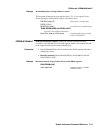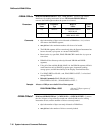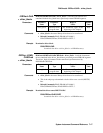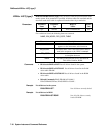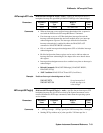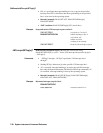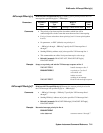
Example Loading Dynamic Configuration information into an allocated RAM segment.
DIAG:NRAM:CRE 6 Allocate a segment of user
RAM
DIAG:BOOT:WARM Re-boot system to complete
allocation
DIAG:NRAM:ADDR? query starting address
enter value to variable X get starting address into X
DIAG:DOWN < value of X> ,table data download table data
VXI:CONF:DCTAB < value of X> link configuration table to
configuration algorithm
DIAG:BOOT:WARM Re-boot to set new
configuration
:DOWNload:SADDress DIAGnostic:DOWNload:SADDress < address>,<data> writes data to
non-volatile User RAM at a single address specified by address, and writes data
to devices with registers in A16 address space.
Parameters Parameter
Name
Parameter
Type
Range of
Values
Default
Units
address numeric 0 to 16,777,215 (# HFFFFFE) none
data arbitrary block
program data
See "Parameter Types", in the
beginning of this chapter
none
Comments • Most computers terminate an OUTPUT, PRINT, or WRITE statement
with a carriage return or carriage return and line feed. These
End-Of-Line characters must be accounted for or suppressed using an
appropriate IMAGE or FORMAT statement. Some helpful methods:
– Control the End-Of-Line characters with format statements.
– Use the Definite Length Arbitrary Block Program Data format to send
your data rather than the Indefinite Length Arbitrary Block Program
Data format.
• A register address in A16 address space can be determined by:
1FC000
16
+ (LADDR * 64) + register_number
where 1FC000
16
is the base address in the System Instrument A16
address space, LADDR is the device logical address, 64 is the number of
address bytes per device, and register_number is the register to which the
data is written.
If the device is an A24 device, the address can be determined using the
VXI:CONF:DLISt command to find the base address in A24, and then
adding the register_number to that value. A24 memory between address
200000
16
and address E00000
16
is directly addressable by the Controller.
• Address may be specified in decimal, hex (# H), octal (# Q), or binary
(# B) formats. DOWNload is done by word (16 bit) access so address
must be even.
• Related Commands: DIAG:UPLoad:SADDress?
DIAGnostic:DOWNload:SADDress
7-14 System Instrument Command Reference



